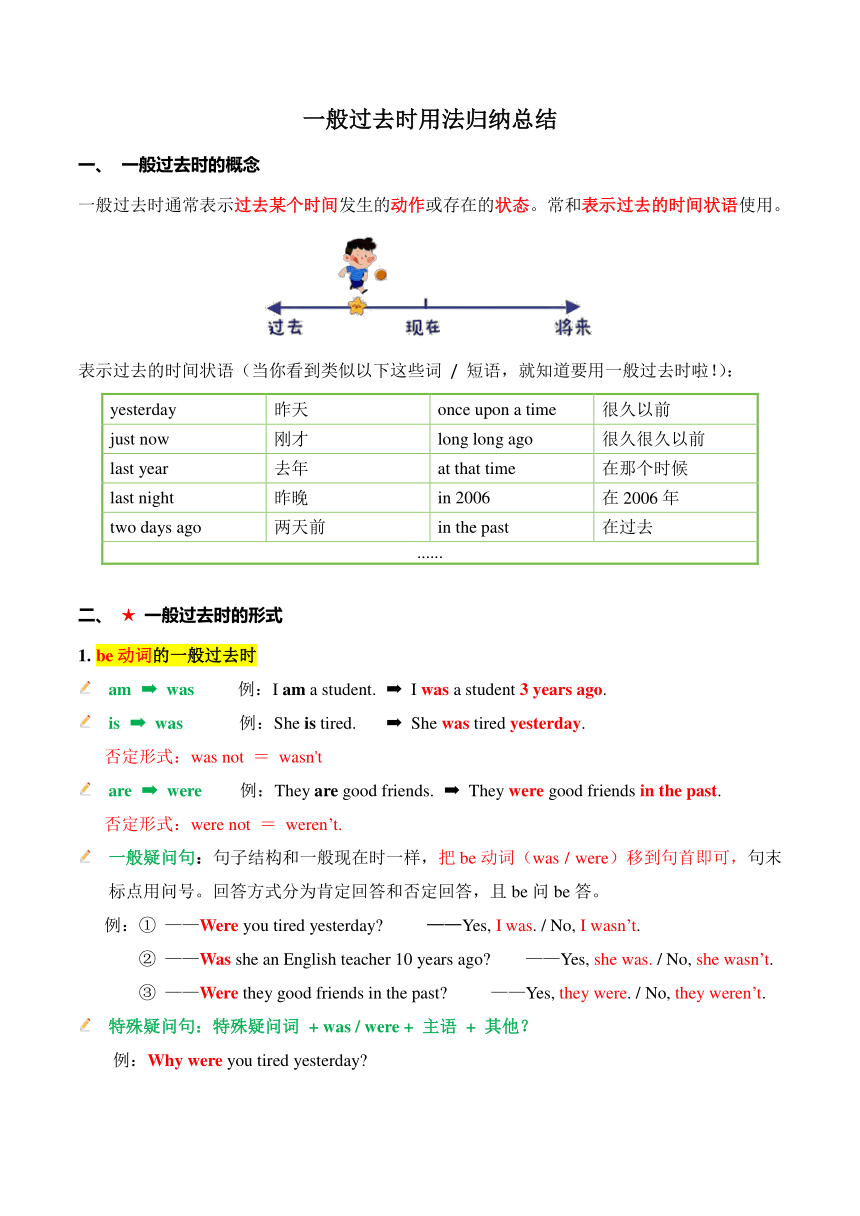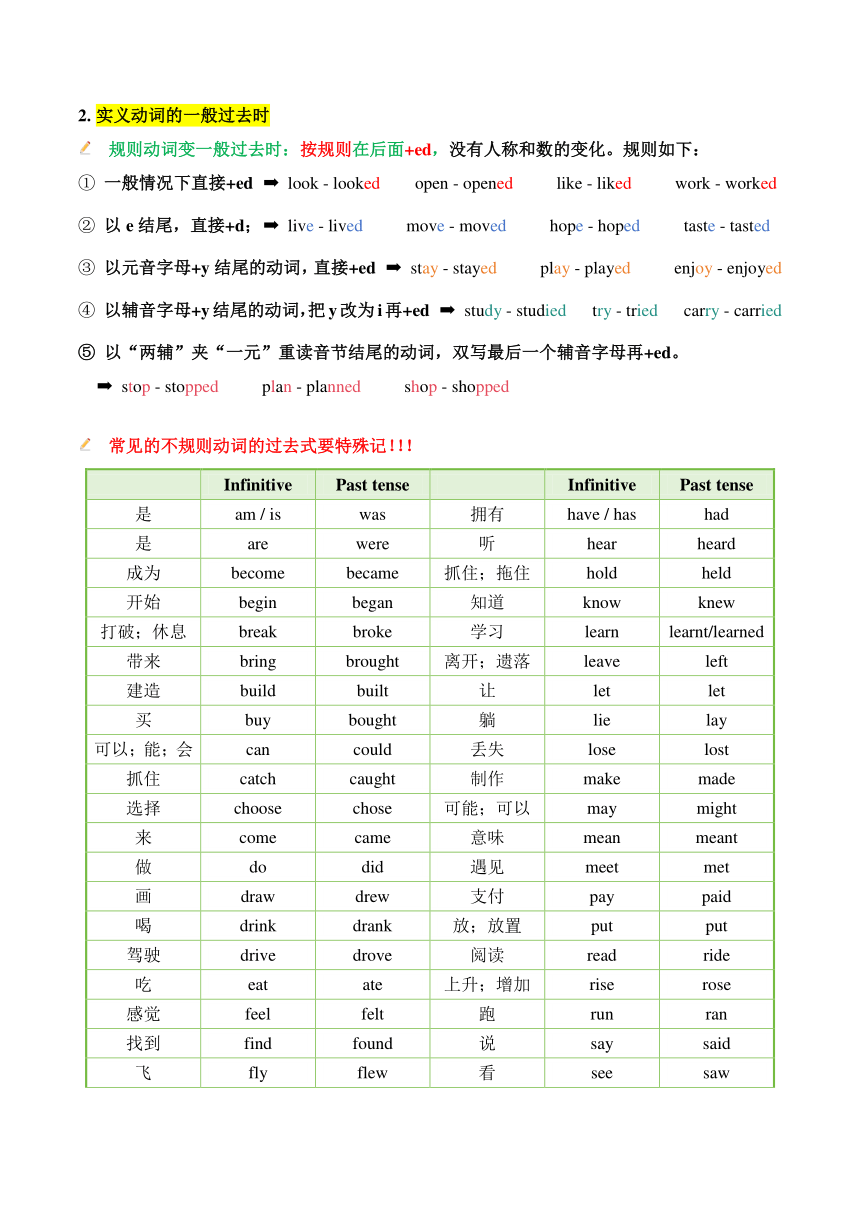2024年中考英语复习学案时态之:一般过去时用法归纳总结(无答案)
文档属性
| 名称 | 2024年中考英语复习学案时态之:一般过去时用法归纳总结(无答案) |

|
|
| 格式 | docx | ||
| 文件大小 | 73.9KB | ||
| 资源类型 | 教案 | ||
| 版本资源 | 通用版 | ||
| 科目 | 英语 | ||
| 更新时间 | 2024-05-16 00:00:00 | ||
图片预览


文档简介
一般过去时用法归纳总结
一般过去时的概念
一般过去时通常表示过去某个时间发生的动作或存在的状态。常和表示过去的时间状语使用。
表示过去的时间状语(当你看到类似以下这些词 / 短语,就知道要用一般过去时啦!):
yesterday 昨天 once upon a time 很久以前
just now 刚才 long long ago 很久很久以前
last year 去年 at that time 在那个时候
last night 昨晚 in 2006 在2006年
two days ago 两天前 in the past 在过去
......
★ 一般过去时的形式
be动词的一般过去时
am was 例:I am a student. I was a student 3 years ago.
is was 例:She is tired. She was tired yesterday.
否定形式:was not = wasn't
are were 例:They are good friends. They were good friends in the past.
否定形式:were not = weren’t.
一般疑问句:句子结构和一般现在时一样,把be动词(was / were)移到句首即可,句末标点用问号。回答方式分为肯定回答和否定回答,且be问be答。
例:① ——Were you tired yesterday ——Yes, I was. / No, I wasn’t.
② ——Was she an English teacher 10 years ago ——Yes, she was. / No, she wasn’t.
③ ——Were they good friends in the past ——Yes, they were. / No, they weren’t.
特殊疑问句:特殊疑问词 + was / were + 主语 + 其他?
例:Why were you tired yesterday
实义动词的一般过去时
规则动词变一般过去时:按规则在后面+ed,没有人称和数的变化。规则如下:
一般情况下直接+ed look - looked open - opened like - liked work - worked
以e结尾,直接+d; live - lived move - moved hope - hoped taste - tasted
以元音字母+y结尾的动词,直接+ed stay - stayed play - played enjoy - enjoyed
以辅音字母+y结尾的动词,把y改为i再+ed study - studied try - tried carry - carried
以“两辅”夹“一元”重读音节结尾的动词,双写最后一个辅音字母再+ed。
stop - stopped plan - planned shop - shopped
常见的不规则动词的过去式要特殊记!!!
Infinitive Past tense Infinitive Past tense
是 am / is was 拥有 have / has had
是 are were 听 hear heard
成为 become became 抓住;拖住 hold held
开始 begin began 知道 know knew
打破;休息 break broke 学习 learn learnt/learned
带来 bring brought 离开;遗落 leave left
建造 build built 让 let let
买 buy bought 躺 lie lay
可以;能;会 can could 丢失 lose lost
抓住 catch caught 制作 make made
选择 choose chose 可能;可以 may might
来 come came 意味 mean meant
做 do did 遇见 meet met
画 draw drew 支付 pay paid
喝 drink drank 放;放置 put put
驾驶 drive drove 阅读 read ride
吃 eat ate 上升;增加 rise rose
感觉 feel felt 跑 run ran
找到 find found 说 say said
飞 fly flew 看 see saw
得到 get got 销售;卖 sell sold
给 give gave 发送;派遣 send sent
去 go went 摇动 shake shook
将要;应该 shall should 拿走 take took
唱 sing sang 教 teach taught
坐 sit sit 告诉 tell told
说 speak spoke 认为;觉得 think thought
拼写 spell spelt / spelled 穿 wear wore
花费;度过 spend spent 将要 will would
站 stand stood 赢 win won
扫 sweep swept 写 write wrote
游 swim swam
肯定句:主语 + 动词过去式(+其他) I visited London.
否定句:主语 + did not + 动原(+其他) did not = didn’t I didn’t visit London.
一般疑问句:Did + 主语 + 动原(+其他)? / 回答方式:did问did答。
——Did you visit London ——Yes, I did. / No, I didn’t.
特殊疑问句:特殊疑问词 + did + 主语 + 动原(+其他)? Where did you visit
一般过去时小练手
写出下列动词过去式
is / am
are
go
play
fly
speak
can
eat
put
say
does
read
bring
worry
make
buy
throw
taste
dance
plant
ask
drink
run
do
draw
swim
jump
用括号内所给单词的正确形式填空
The cat (catch) a mouse last night.
I (become) a doctor 10 years ago.
Betty (break) a glass last week.
My mum and I (go) shopping yesterday.
Adam (walk) to school yesterday morning.
(do) your brother (watch) a movie in the past
(be) Nancy tall when she was 9 years old
Students (be) at school just now.
My uncle (buy) a new bike for me the day before yesterday.
Once upon a time there (be) a beautiful girl lived in the forest.
There (be) some milk on the table last Sunday.
The book (be) on the sofa yesterday evening.
——Where (do) you visit during the summer holiday —— I visited Beijing.
We often (play) games last term .
He (be) here an hour ago.
The girl (get) up very early yesterday morning.
He (not watch) TV yesterday evening.
Mr. Green (come) to my home at that time.
She (write) a letter to her pen friend last Saturday.
Jim’s sister (not practice) playing the piano yesterday.
一般过去时的概念
一般过去时通常表示过去某个时间发生的动作或存在的状态。常和表示过去的时间状语使用。
表示过去的时间状语(当你看到类似以下这些词 / 短语,就知道要用一般过去时啦!):
yesterday 昨天 once upon a time 很久以前
just now 刚才 long long ago 很久很久以前
last year 去年 at that time 在那个时候
last night 昨晚 in 2006 在2006年
two days ago 两天前 in the past 在过去
......
★ 一般过去时的形式
be动词的一般过去时
am was 例:I am a student. I was a student 3 years ago.
is was 例:She is tired. She was tired yesterday.
否定形式:was not = wasn't
are were 例:They are good friends. They were good friends in the past.
否定形式:were not = weren’t.
一般疑问句:句子结构和一般现在时一样,把be动词(was / were)移到句首即可,句末标点用问号。回答方式分为肯定回答和否定回答,且be问be答。
例:① ——Were you tired yesterday ——Yes, I was. / No, I wasn’t.
② ——Was she an English teacher 10 years ago ——Yes, she was. / No, she wasn’t.
③ ——Were they good friends in the past ——Yes, they were. / No, they weren’t.
特殊疑问句:特殊疑问词 + was / were + 主语 + 其他?
例:Why were you tired yesterday
实义动词的一般过去时
规则动词变一般过去时:按规则在后面+ed,没有人称和数的变化。规则如下:
一般情况下直接+ed look - looked open - opened like - liked work - worked
以e结尾,直接+d; live - lived move - moved hope - hoped taste - tasted
以元音字母+y结尾的动词,直接+ed stay - stayed play - played enjoy - enjoyed
以辅音字母+y结尾的动词,把y改为i再+ed study - studied try - tried carry - carried
以“两辅”夹“一元”重读音节结尾的动词,双写最后一个辅音字母再+ed。
stop - stopped plan - planned shop - shopped
常见的不规则动词的过去式要特殊记!!!
Infinitive Past tense Infinitive Past tense
是 am / is was 拥有 have / has had
是 are were 听 hear heard
成为 become became 抓住;拖住 hold held
开始 begin began 知道 know knew
打破;休息 break broke 学习 learn learnt/learned
带来 bring brought 离开;遗落 leave left
建造 build built 让 let let
买 buy bought 躺 lie lay
可以;能;会 can could 丢失 lose lost
抓住 catch caught 制作 make made
选择 choose chose 可能;可以 may might
来 come came 意味 mean meant
做 do did 遇见 meet met
画 draw drew 支付 pay paid
喝 drink drank 放;放置 put put
驾驶 drive drove 阅读 read ride
吃 eat ate 上升;增加 rise rose
感觉 feel felt 跑 run ran
找到 find found 说 say said
飞 fly flew 看 see saw
得到 get got 销售;卖 sell sold
给 give gave 发送;派遣 send sent
去 go went 摇动 shake shook
将要;应该 shall should 拿走 take took
唱 sing sang 教 teach taught
坐 sit sit 告诉 tell told
说 speak spoke 认为;觉得 think thought
拼写 spell spelt / spelled 穿 wear wore
花费;度过 spend spent 将要 will would
站 stand stood 赢 win won
扫 sweep swept 写 write wrote
游 swim swam
肯定句:主语 + 动词过去式(+其他) I visited London.
否定句:主语 + did not + 动原(+其他) did not = didn’t I didn’t visit London.
一般疑问句:Did + 主语 + 动原(+其他)? / 回答方式:did问did答。
——Did you visit London ——Yes, I did. / No, I didn’t.
特殊疑问句:特殊疑问词 + did + 主语 + 动原(+其他)? Where did you visit
一般过去时小练手
写出下列动词过去式
is / am
are
go
play
fly
speak
can
eat
put
say
does
read
bring
worry
make
buy
throw
taste
dance
plant
ask
drink
run
do
draw
swim
jump
用括号内所给单词的正确形式填空
The cat (catch) a mouse last night.
I (become) a doctor 10 years ago.
Betty (break) a glass last week.
My mum and I (go) shopping yesterday.
Adam (walk) to school yesterday morning.
(do) your brother (watch) a movie in the past
(be) Nancy tall when she was 9 years old
Students (be) at school just now.
My uncle (buy) a new bike for me the day before yesterday.
Once upon a time there (be) a beautiful girl lived in the forest.
There (be) some milk on the table last Sunday.
The book (be) on the sofa yesterday evening.
——Where (do) you visit during the summer holiday —— I visited Beijing.
We often (play) games last term .
He (be) here an hour ago.
The girl (get) up very early yesterday morning.
He (not watch) TV yesterday evening.
Mr. Green (come) to my home at that time.
She (write) a letter to her pen friend last Saturday.
Jim’s sister (not practice) playing the piano yesterday.
同课章节目录
